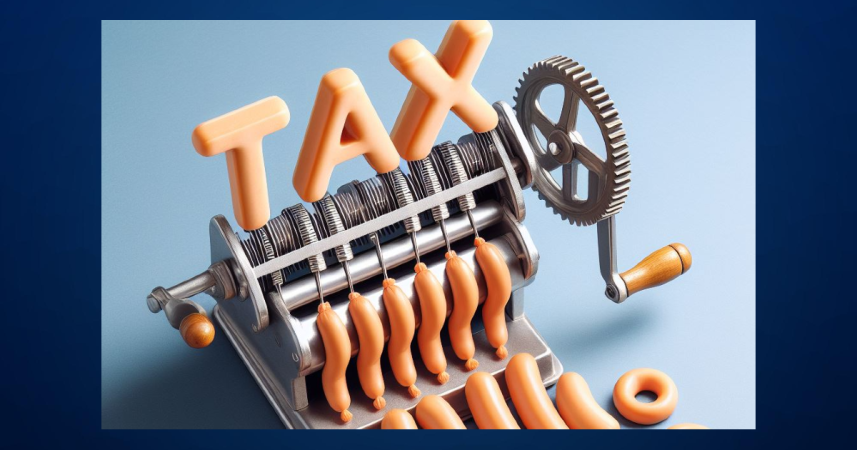The Virginia General Assembly has now jumped into the brave new world of taxing the digital economy, but the sales tax provisions it adopted in the budget conference report Saturday are not the same ones that appeared in earlier budget versions. The cabal of tax raisers in the secret final negotiation got creative.
As the final budget negotiations began, the House of Delegates and Senate budgets differed on the key point of whether to exempt businesses from paying sales and use taxes on a host of digital services and goods. By extending the tax to business transactions, the Senate proposed to collect about $1 billion more for its spending plans.
The tax amendment both bodies approved Saturday agreed with the Senate position of extending the tax onto business transactions but did not include the full list of digital services that will now be taxable for individuals. The business taxpayers will only have to pay on “software application services.”
If this budget provision survives and becomes law effective July 1, beginning in 2025 individuals will also have to pay on “computer-related services, web hosting and design, data storage, and streaming services.” Those are on top of the various digital products that more closely parallel traditional tangible goods, such as a downloaded movie or book.
The final draft adds very consequential language about how to tax bundled transactions of both goods and services, paragraphs that appeared in no version during the regular Assembly process. And it loops in Virginia’s existing sales tax on communication services, which was the state’s first foray into taxing services when approved more than a decade ago.
Both are complicated provisions, substantive changes in tax policy, that were sprung on outsiders as a surprise when the conference report was revealed late Thursday. In the 48 hours before the vote, no full analysis emerged. During the brief floor debates, neither issue was a topic. The infamous law of unintended consequences will be in full play.
The new code section on bundled services can be found in the text at §58.1-603.3. Then the bundled transaction language is applied to the communications sales tax at §58.1-650. If a different tax rate would normally apply to different parts of the transaction, the higher of the two rates could be imposed on all of it.
For the average taxpayer, these details will be gibberish. They will simply pay more tax on scores or hundreds of annual purchases, and in most cases will never notice the sales tax buried on the bill. But for Virginia’s business community, the details will matter, and the coming process to develop guidelines at the Virginia Department of Taxation will be fraught with peril.
Only a half dozen or so other states already tax digital products and services, and their rules on how to treat business-to-business transactions vary widely.
Republican Governor Glenn Youngkin is strongly opposed to what just happened, and the sales tax base expansion is the main reason 14 Senate Republicans and 37 House Republicans voted nay on the conference report Saturday. Youngkin is correct in his assertion that once it is fully in effect, it costs taxpayers about $1.5 billion per year. It also increases the cost impact on taxpayers of the bills on his desk allowing an additional 1% sales tax bite for local school capital projects.
But by burying the issue in the budget, something Youngkin did to himself, he complicated his ability to simply veto the budget item outright. There have been legal arguments in the past over gubernatorial vetoes of budget language, and now such a veto would have to be accompanied by a detailed list of major spending reductions.
To repeat a line from two months ago: “The dilemma the governor will face in the final budget showdown in March is obvious to everybody who has a cursory understanding of how the budget process works.”
In the brief floor debates, Republicans did point out that the sales tax is regressive, in that it takes a larger chunk out of the incomes of lower- and middle-income taxpayers. In recent years Democrats have postured that they want to make Virginia’s tax code less onerous to the poor, but the 2024 session will make our tax code more onerous. To steal a song line, a pocketful of mumbles, such are promises.
More telling was a colloquy Saturday between Delegate Lee Ware, R-Powhatan, and Delegate Vivian Watts, D-Fairfax. Ware has been chair of the House Finance Committee, Watts is now. Ware’s questions illustrated how that committee has totally lost its authority and the big spenders of the House Appropriations and Senate Finance committees have grabbed all that power.
Until just a few years ago, the power to tax and spend were centered in different committees, at least on the House side. And even on the Senate side, the rules worked to keep taxing and spending bills separate. A standing rule specifically required that any bill on revenue issues had to clear committee and the full floor vote first — in effect deciding the revenue amounts before the spenders got their hands on it.
A line appeared on every session calendar, designating a deadline for “Committees responsible for revenue bills to complete work by midnight,” in advance of the budget bills. That line is now gone from the calendar and the spending foxes are in total command of the taxpaying chickens. The separate revenue process is also undermined by this growing practice of embedding tax bills into the introduced budget.
Legislators are not ones to surrender power, as all the failed 2024 campaign finance reform efforts proved once again. The passage of this massive tax policy revision within the budget bill, with the final language only appearing in the final hours, cements the future practice. It is one more reason Virginia is increasingly considered less and less a stable, reliable place to do business.

Steve Haner is a Senior Fellow for Environment and Energy Policy. He can be reached at Steve@thomasjeffersoninst.org.






